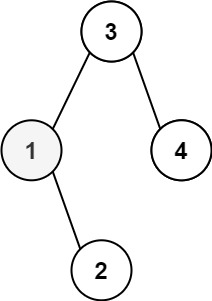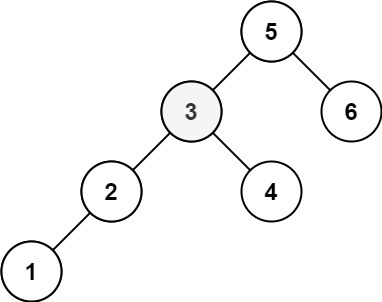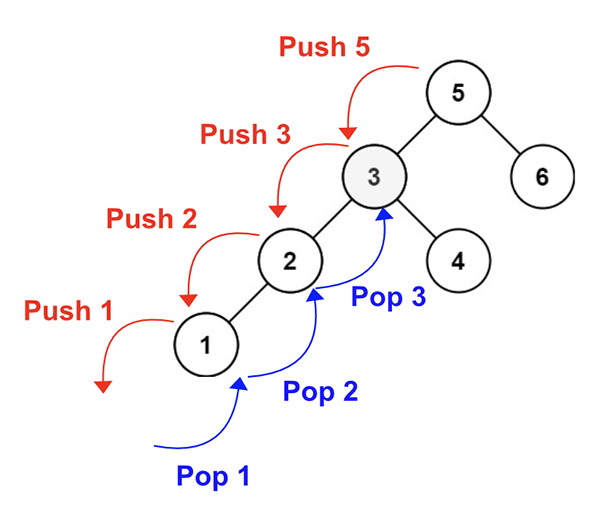Tree - Kth Smallest Element in a BST
All diagrams presented herein are original creations, meticulously designed to enhance comprehension and recall. Crafting these aids required considerable effort, and I kindly request attribution if this content is reused elsewhere.
Difficulty : Easy
InOrder Traversal
Problem
Given the root of a binary search tree, and an integer k, return the kth smallest value (1-indexed) of all the values of the nodes in the tree.
Example 1:
1
2
Input: root = [3,1,4,null,2], k = 1
Output: 1
Example 2:
1
2
Input: root = [5,3,6,2,4,null,null,1], k = 3
Output: 3
Solution
This is a typical problem of InOrder traversal. We can use either recursion or stack to solve this iteratively.
InOrder Traversal using Stack
Here is the base code for InOrder Traversal. I have added code comments for better understanding.
1
2
3
4
5
6
7
8
9
10
11
12
13
14
15
16
17
18
19
20
21
22
23
24
25
# List in python can be used as stack
stack = []
# while either root or the stack is not None or Empty
while root or stack:
# Keep traversing the left nodes
# and push the root node to stack
while root:
stack.append(root)
root=root.left
# root node is now None
# but stack may not be empty
# fetch the last node from stack
root = stack.pop()
# since the left node was already
# visited for this root
# Now visit right node and
# again keep traversing left
# of that right node until None
root = root.right
Solve using InOrder Traversal with Stack
Now This problem can be easily solving by decrementing k whenever a node is popped from the stack. Once k==0 return the val of the popped root node.
1
2
3
4
5
6
7
8
9
...
root = stack.pop()
# decrment k
k-=1
if k == 0 :
return root.val
...
InOrder Traversal with Recursion
The recursion code is surprisingly shorter. All we do here is return when reached the None else keep traversing the left nodes. Once all the left node of the root have been traversed, then traverse the right node. The logic is exactly same as using stack.
Here the function call stack is used.
1
2
3
4
5
6
7
8
def inorder(root):
if not root:
return
inorder(root.left)
inorder(root.right)
inorder(root)
Solve using InOrder Traversal with Recursion
Now we can easily modify the above code to solve this problem.
1
2
3
4
5
6
7
8
9
10
11
12
13
14
15
16
17
18
19
20
21
22
23
24
25
26
27
# Create an outer variable to hold the value
smallest = None
def inorder(root):
# defind k and smallest as nonlocal
# so that we can update them inside this
# function instead of re-initializing them
# in local scope
nonlocal k
nonlocal smallest
if not root:
return
inorder(root.left)
# Same code as we have in the
# iterative solution using stack
k -= 1
if k==0:
smallest = root.val
inorder(root.right)
inorder(root)
return smallest
Final Code
Using InOrder Traversal with Stack
Here is the full code.
1
2
3
4
5
6
7
8
9
10
11
12
13
14
15
16
17
18
19
# class TreeNode:
# def __init__(self, val=0, left=None, right=None):
# self.val = val
# self.left = left
# self.right = right
def kth_smallest(root:TreeNode, k):
stack =[]
while stack or root:
while root:
stack.append(root)
root=root.left
root = stack.pop()
k-=1
if k == 0:
return root.val
root = root.right()
Using InOrder Traversal with Recursion
Here is the full code.
1
2
3
4
5
6
7
8
9
10
11
12
13
14
15
16
17
18
def kth_smallest(root, k):
smallest = None
def inorder(root):
nonlocal smallest
nonlocal k
if not root:
return
inorder(root.left)
k -= 1
if k == 0:
smallest = root.val
inorder(root.right)
inorder(root)
return smallest


